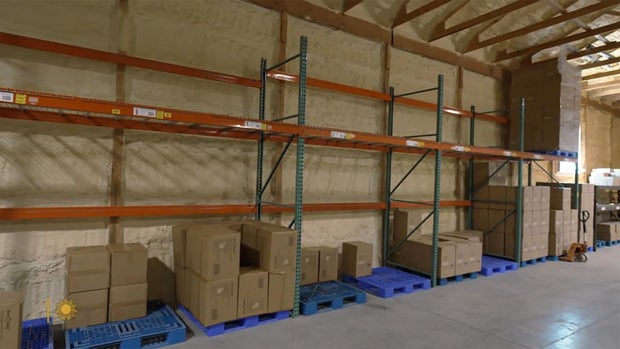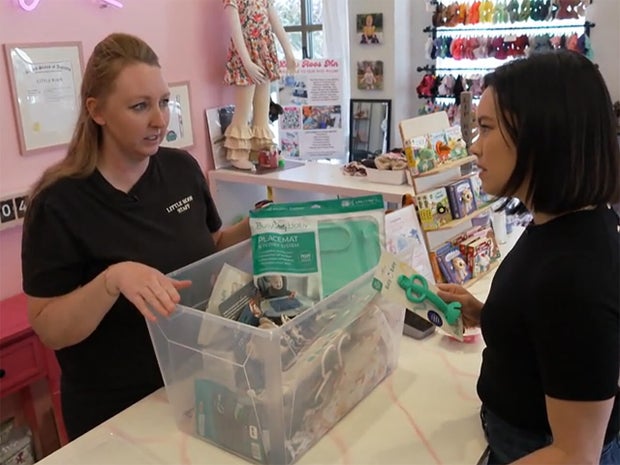Article Summary
Beth Benike, a mom, veteran, and small business owner, is raising an alarm about the impact of President Trump’s 145% tax on Chinese imports on her company, Busy Baby. The tax imposed on products made in China has resulted in a $230,000 fee for Benike to get her inventory from the factory to the US. Benike is not alone in feeling the pinch of the tariffs. Economists predict that most goods, including clothing, electronics, and toys, will become more expensive or even go out of stock. Yale’s Budget Lab estimates that tariffs could add nearly $5,000 to families’ household expenses.
What This Means for You
- If you are a small business owner, the tariffs on Chinese imports could significantly increase your production costs and potentially put you out of business if you are unable to afford the fees.
- If you are a consumer, it’s essential to start padding your emergency fund and consider purchasing goods that you need before prices become more expensive.
- As a citizen, you should be aware of the impact of these tariffs on small businesses and the potential consequences on the economy as a whole.
- The legality of the Trump administration’s implementation of tariffs without congressional approval is being challenged in the courts.
Original Post
Beth Benike is a mom, a veteran, and a small business owner – and she’s sounding the alarm. “I’ve been telling all of my friends and family that anything you want for Christmas, to get it right now, especially if you’re buying for children. If you are buying any baby products at all, get them while they’re here, because they’re gonna be gone.”
After a decade serving in the Army, stationed in Bosnia, Kuwait, Iraq and beyond, Benike started Busy Baby, a Minnesota company that designs and sells placemats and utensils for babies and toddlers. All her products are made in China. And now, those products are subject to President Trump’s 145% tax on Chinese imports.
“We have three months’ worth of products sitting at the factory,” Benike said. “And now, in order to get it here, we need $230,000 on top of what we’ve already paid for the product, just to get it in the country.”
“Can you afford that?” I asked.
“Oh God, no,” Benike replied.
“So, what do you do?”
“First, I sat on my kitchen floor and cried,” Benike said. “And when I was on the floor in the kitchen, my son came in to show me something or tell me something, and he saw me sitting there, crying. My eight-year-old son. … And he put his arms around me and just hugged me. And, like, I realized I’m not gonna let him see this. This is not what we’re gonna be.”
The tariffs hit just after Benike struck a deal to sell Busy Baby products at Target and Walmart. To produce enough inventory, she took out a loan from the Small Business Administration.
“That loan is partially SBA-financed, and then partially leveraged against my house,” Benike said. “So, if I can’t stay in business and pay those loans, I lose the house.”
Inside Benike’s warehouse, this is what’s left:
Once this inventory is sold, Benike said, “then we’re out of product. Then we’re sold out. We’ve got nothing more coming in.”
One of the retailers Benike supplies is Little Roo’s, in Chaska, Minnesota. Owner Marissa Held-Nordling says she has seen shopper behavior change since tariffs were introduced. For the first time ever, she is allowing customers to stockpile baby registry gifts, like Benike’s Busy Baby mats.
“You can’t just do a registry anymore, because the products aren’t guaranteed that it’s still going to be on the shelf,” said Held-Nordling.
“So, at this point I’m allowing people to come in and fill a bin, and they can get their exact colors … and then I close the bin and I take this product off my website,” she continued.
While the U.S. and China begin trade talks, economists still expect most goods to get more expensive – or even go out of stock, from clothing to electronics to toys. Yale’s Budget Lab says tariffs could add nearly $5,000 a year to families’ household expenses.
Kyla Scanlon, an economic analyst and author of “In This Economy? How Money & Markets Really Work,” said, “It’s probably a smart time to take advantage of this weird, uncertain moment to make sure that you have what you need, just in case prices do get more expensive. If you don’t need something right away, a lot of financial advisors would recommend that you do start padding your emergency fund, and putting some money to the side.”
Key Terms
- Tariffs
- Small Business
- President Trump’s Tax on Chinese Imports
- Economy
- Household Expenses
ORIGINAL SOURCE:
Source link







